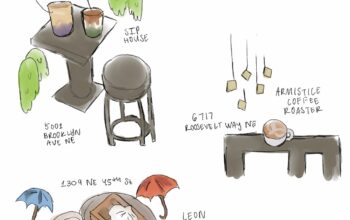In a time characterized by sweeping change, demanding graduation credit requirements have remained the same. They shouldn’t.
Current Roosevelt students are limited to 24 available class slots over four years — the majority of which are allotted for core classes and other courses required by Seattle Public Schools for graduation. This leaves just two credits of space for electives.
Senior Jack Arnold commented on his experience with the choice restrictions, “It was really frustrating freshman year not having as many choices, I just felt restricted, there was so much you could do, but you weren’t able to do much of it.”
Arnold’s sentiment is shared among his fellow upperclassmen, as many wish they were able to take more classes they felt passionate about. Certain mandated credits, such as the one art credit and one-and-a-half Career Technical Education (CTE) credits, may seem unnecessary for certain students. Both are part of the graduation requirements, but they occupy space that is better spent up to the discretion of students.
For art-driven students, for example, there are far more useful classes to take than engineering, a CTE course that can meet the credit requirement. This trend is true across all subjects.
When freshmen come to Roosevelt for the first time, or when sophomores begin attending in-person classes, they have a wide selection of classes available to them — something that Counselor Ron Stuart urges students to take advantage of: “You can sample different career-type classes in just a semester, and get a taste for it,” Stuart says.
Stuart also encourages students to take unique courses and stretch their limits, “It’s your chance to do that with no real investment.” He goes on to explain that students are here for four years, “Why not take advantage of the offerings that are here, while you’re here and it’s offered to you for free?”
And yet, it’s difficult to chase after these stimulating and unique courses when the credit requirements are so strict.
Proponents of the credit requirement often argue that a required course could lead to discovering a life-long passion. However, oftentimes it ends up being a course taken out of necessity.
Moreover, the strict credit requirement is restrictive for Roosevelt’s musicians. Students of Roosevelt’s highly acclaimed jazz band, known for competing in large competitions in New York and Beijing, among other locations, have less flexibility in exploring the elective curricula.
For example, for most jazz students, participation is a requirement before and after school. The music department will also require these musicians to take an elective of music during the school day.
Similarly, band students have one elective slot during the day filled. This leaves these musicians with only one elective space available, which is often filled by the required language classes, leaving no room for personal choice.
Unfortunately for Roosevelt musicians, this makes exploring electives and passions a more difficult endeavor, as well as adding to the stress of high school. Many are often preoccupied with concerts, rehearsals, and other activities that come with being a band member in addition to schoolwork. As many have experienced this year, it is hard enough to remain on top of schoolwork, not to mention extracurriculars.
This requirement also restricts students from prioritizing their mental health, which is a larger concern now more than ever before. The pandemic and the transition back to in-person school has put many students under a lot of stress, so taking an easier or more enjoyable class, or a free period to reduce workload, may seem like a great option. Due to this credit requirement, unfortunately, it may not be very realistic.
However, there are workarounds. For students who enrolled in advanced courses in middle school, those may contribute toward graduation. Further, the physical education credit can be fulfilled by sport participation outside of school hours.
But not everyone can use these workarounds. Not everyone is interested in sports, or took languages in middle school, and these people are left with the stringent requirement.
The sheer concept of having the same requirement for everyone at a school of about 1,500 students is absurd. No two students are the same.
While a requirement for bare minimum credits is a good idea, the current system is monotonous, leaving no room for individuality and very little space for pursuing passions. Many students must replace their priority subjects with ones they are not interested in, distracting themselves from their goals. Judging all students under the same requirement is a factory-era practice that must end.


